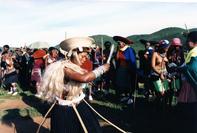Traditional Zulu Religion
Throughout Zulu history, there has been hardly an aspect of traditional Zulu life in which religion has not played a part: in warfare, in ceremonies, in the different stages and crises in people's personal lives, in agriculture and economic well-being and so on.

At all times, the ancestors are looked upon as the source from which help and guidance can be derived after appropriate propitiation through sacrificial offerings. In addition to the respect they show their ancestors, the Zulu also believed in a supernatural being, Unkulunkulu, who 'sprang from a bed of reeds' and who created all wild animals, cattle and game, snakes and birds, water and mountains, as well as the sun and the moon.
According to Zulu beliefs, human beings have a body 'umzimba' and a spirit or soul 'idlozi'. In addition, there is the inhliziyo 'heart or feelings', the ingqondo - brain, mind, understanding - and the isithunzi - shadow, personality.
The Zulu believe that the isithunzi becomes the ancestral spirit after death, but only after the ukubuyisa ceremony has been performed, during which the spirit is 'brought back home'. Sacrifice plays an important role in maintaining contact with the ancestral spirits, providing a 'bridge' which enables the individual to ask for favours or to thank the ancestral spirits for their blessings.
Ancestral spirits are believed to have the power to regulate the forces of nature and are approached before all important events.
Types of Sacrifices
The Zulu distinguish two classes of sacrifice. The thanksgiving 'ukubonga' takes place when something good has come about, such as when a boy reaches puberty, when there is plenty of food, or when life in the umuzi has gone smoothly and there has been little sickness.
The ukuthetha, a scolding sacrifice, takes place when people of the umuzi die unexpectedly, or when things seem to go wrong and the individual feels persecuted. All sacrifices, which are usually of cattle or goats, are performed according to ritual and the strict observation of procedure and protocol, since, if these are not followed, the sacrifice may not only bring about no benefits but could even be detrimental.
During the 20th century, many traditionalists have become members of one of the independent churches, which seek to combine Christian practice with respect for the ancestors. One of these, the Ibandla lamaNazaretha, is especially popular among rural Zulu.
Founded in 1911 by Isaiah Shembe, it is known colloquially as the Shembe church, The headquarters of this church are at Inanda on the outskirts of Durban, but it has many followers in rural communities, who wear distinctive beaded garments, and who worship through song and dance.
Translated by Lawrence Ndou
 South Africa is home to a wide array of vibrant, rich cultures, each with their own deep history. SouthAfrica.co.za tells the stories of the...
South Africa is home to a wide array of vibrant, rich cultures, each with their own deep history. SouthAfrica.co.za tells the stories of the... Shaka, who became the chief of the tiny Zulu group in 1818, laid the foundations of the Zulu nation and built the mightiest empire in southe...
Shaka, who became the chief of the tiny Zulu group in 1818, laid the foundations of the Zulu nation and built the mightiest empire in southe...